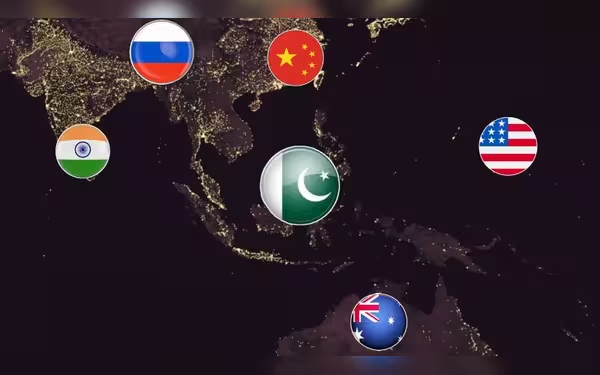Saturday, November 16, 2024 05:37 PM
India Emerges as New Strategic Ally for the West
- India is now a focal point for Western powers.
- Pakistan's status as a Western ally is diminishing.
- Technological advancements are reshaping military strategies.
 Image Credits: thefridaytimes
Image Credits: thefridaytimesIndia's rise as a strategic ally for the West signals a shift in global power dynamics, impacting Pakistan's role in international relations.
The geopolitical landscape is undergoing a significant transformation, with India emerging as a new focal point for Western powers. This shift is particularly evident in the context of the United States' changing priorities, as it pivots from a counter-terrorism framework to a more complex superpower competition. For over two decades, Pakistan was seen as a crucial ally in the global fight against terrorism, often receiving accolades for its military efforts. However, as the world moves towards a new paradigm, the implications for Pakistan are profound.
Historically, Pakistan has been at the forefront of the War on Terror, acting as a frontline state and a key partner for the United States. The military's role in counter-terrorism earned it significant praise from Western allies, including the Australian Army Chief, who recently commended Pakistan's efforts. Yet, this recognition may inadvertently lead to a stagnation in Pakistan's security strategy. The global focus has shifted, and the once-cherished status of being a "darling of the West" is now overshadowed by the emergence of new alliances and priorities.
As the United States grapples with the rise of an anti-American coalition comprising nations like China, Russia, Iran, and North Korea, its military strategy is evolving. The Indo-Pacific region has become a central focus, with India positioned as a counterweight to China. The U.S. Department of Defense has emphasized the importance of this region, highlighting its strategic significance for America's future. This shift in focus indicates that counter-terrorism efforts are no longer the primary concern for Western powers; instead, they are now more invested in military rivalries and economic competition.
Pakistan's military, while still engaged in counter-terrorism, faces a challenging environment on its western border with Afghanistan. The ongoing volatility in this region, coupled with the changing dynamics of international relations, raises questions about the future of Pakistan's military strategy. The praise from Western allies, while flattering, may not translate into tangible support in the face of emerging threats.
Moreover, the technological gap between the U.S. and its rivals is narrowing. China's advancements in military technology have made it a formidable competitor, prompting Western military experts to reassess their strategies. The focus on innovative and disruptive military technologies is becoming increasingly critical, as the nature of warfare evolves.
Australia's role in this shifting landscape cannot be overlooked. As a key player in the Indo-Pacific strategy, Australia is keen on forming alliances that bolster its position against China, with India taking a leading role in these efforts. The exclusion of Pakistan from this strategic framework is not merely an oversight; it reflects a deliberate choice to strengthen ties with New Delhi.
The changing dynamics of international politics present both challenges and opportunities for Pakistan. As the world moves towards a new era defined by superpower competition, it is crucial for Pakistan to reassess its position and adapt its strategies accordingly. The focus on counter-terrorism may no longer suffice; instead, Pakistan must navigate the complexities of a rapidly evolving geopolitical landscape. The future will depend on how effectively Pakistan can redefine its role and engage with the shifting priorities of global powers.













